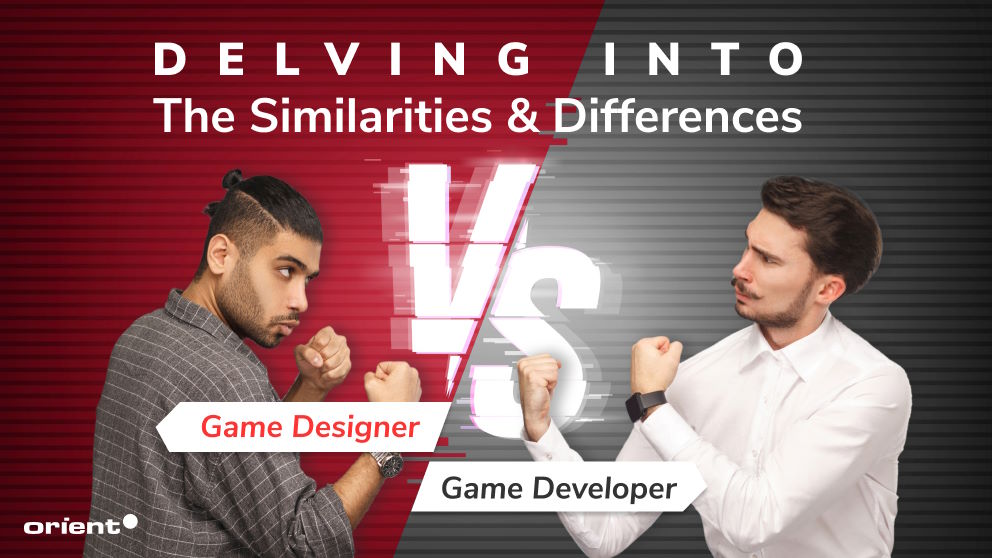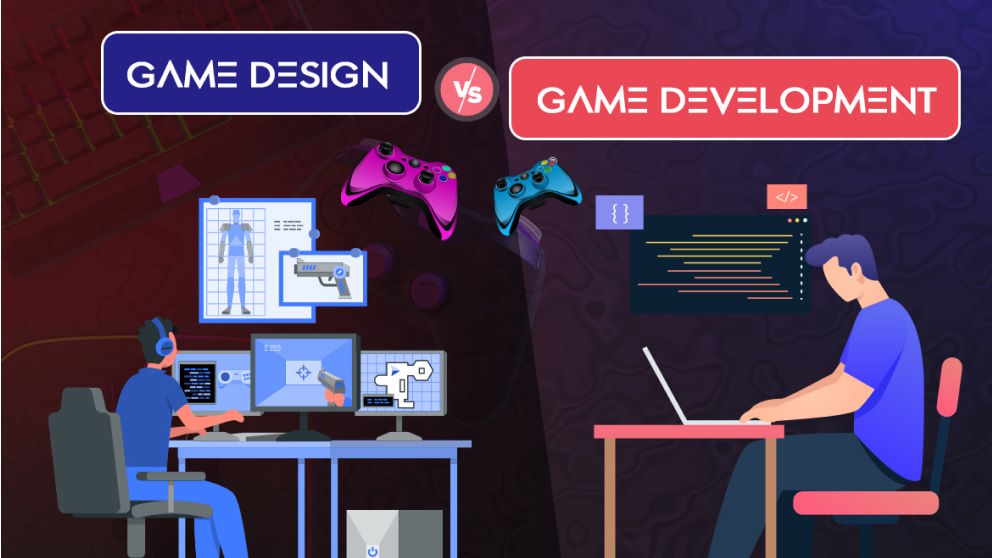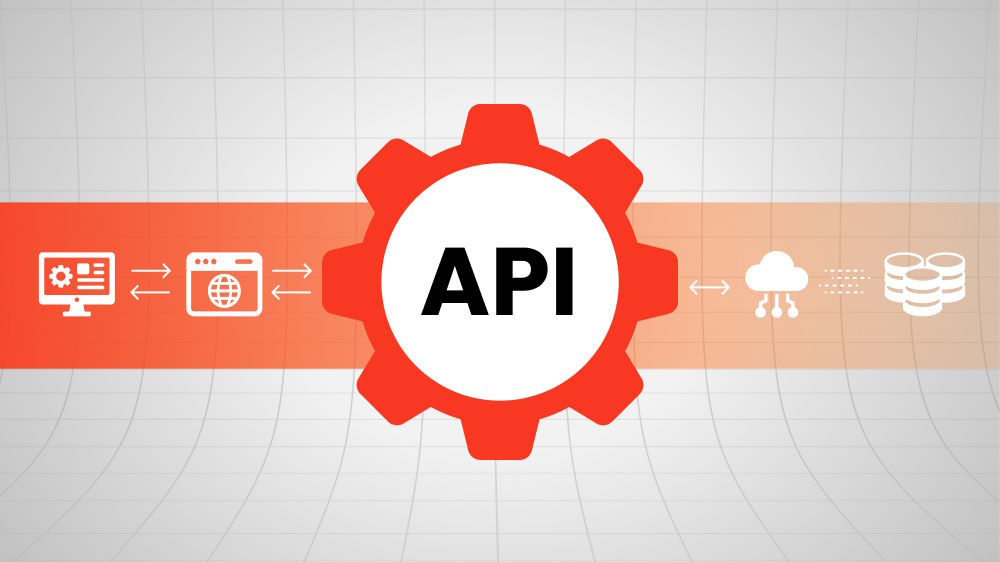Game Designer vs. Game Developer: Delving into the Similarities and Differences

Content Map
More chaptersThe video game industry has made great strides in recent years, making it a popular choice for companies with a passion for turning innovative game ideas into real-world hits. However, developing an actual game is more than a daunting task, requiring much effort and expertise. Among them, game design and game programming are two indispensable technical aspects that make game projects complete.
While there may be some overlap in the respective responsibilities of game designer vs. game developer, there are distinct differences between the two disciplines. Having a clear understanding of these roles allows the business owner to deploy the right hiring strategy, effectively build their game development team, improve collaboration, and make informed decisions throughout the development process. Without further ado, let’s delve into the detailed comparisons.
Video Game Industry Overview: The Evolution of Video Game Development

If the revenue of the gaming industry only reached $120 billion four years ago, this number is predicted by experts to reach US$406.20 billion by the end of 2023. The strong dominance of modern digital transformation technologies such as artificial intelligence (AI), blockchain software development, virtual reality (VR), augmented reality (AR), cloud computing, computer science, etc., have opened up many favorable development opportunities for the gaming industry.
From traditional gaming experiences simply focusing on game mechanics by using consoles, PCs, or handheld devices, the gaming industry with modernization is raising the level of immersion, making players feel like they are part of the virtual world. However, the emergence of a diverse range of gaming preferences does not make simple arcade games obsolete. On the contrary, many users still prefer traditional gaming experience due to their simplicity and familiarity.
With the steady increase in smartphone usage, internet penetration, and the growing popularity of e-sports, the gaming industry is continuously bridging the gap between tradition and modernity. As a result, it promises to achieve more milestones in the future, thus contributing significantly to global economic development.
The game industry is widely regarded as one of the most competitive industries, with developers and publishers vying for a slice of the market share. Creativity and innovation are now indispensable factors in making the game playable for the target audience and contributing to the industry’s diversity.
Who are Game Designers?

Game designers are creative individuals responsible for creating the game mechanics, concept, and overall player experience of a video game. They play a pivotal role in planning and shaping various aspects of a game, including the rules, objectives, level design, characters, progression systems, and more.
By working closely with other game development team members, such as artists, game programmers, writers, and sound designers, game designers with a high level of collaboration ensure that the game’s mechanics align with the desired player experience, creative direction, and technical constraints.
The game designer’s idea description is considered the “magnetic needle” for the entire process of building, developing, and perfecting a video game. Because of the importance of the game designer position, people who hold this position are required to have high expertise and many years of experience working in the game field.
While game designers may contribute to the visual aspects of a specific game, which may lead to confusion with game artists, their primary focus is solely on creating compelling gameplay experiences that captivate and engage players. However, depending on the size of the development team and project requirements, a game designer, in some cases, may have additional skills in art or vice versa to cover the needs of video game design completion.
Who are Game Developers?

The term “game developer” can be used and understood differently depending on the use context. To many people, “game developer” refers to “anybody who works on making games,” which could be artists, game programmers, sound effects creators, play testers, dialog writers, etc. However, as we are making a specific comparison between a game designer versus a game developer, game developers are understood in a smaller scope with the following definition.
A game developer, also known as a game programmer, is a highly skilled professional who uses software code to bring the game designer’s ideas to life. Their main task is to work on various technical aspects of game development, including gameplay programming, engine programming, tool development, optimization, and bug fixing to create a complete game product.
Similar to software developers in other development processes, game developers are required to have good coding skills, an understanding of different types of programming languages, and timely updates on features of new technology games.
By working closely with other members of the development team, game programmers ensure a quality final product with a full range of features while delivering immersive gaming experiences to players worldwide.
Video Game Designer vs. Video Game Developer: Exploring the Main Similarities

While game designers and game developers have distinct roles and responsibilities in the development process, they still share several similarities.
- Creative Collaboration: Working closely with other development team members is a must for any role. Both game designers and game developers have to discuss ideas, share concepts, and iterate on designs to ensure that the vision for the game is realized.
- Shared Goal: By combining skill and expertise, game designers and game developers both share the common goal of developing an engaging video game experience for players and delivering a cohesive product.
- Customer-centric Approach: Both game designers and game developers work with customer factors in mind. Through activities such as analyzing market trends, conducting user research, and considering user feedback, they gain a deep understanding of player preferences and needs and together create a game that meets market needs.
- Technical Knowledge: While game designers focus more on the creative aspects of a specific game, they still require a certain level of technical knowledge. Likewise, game developers need basic knowledge of creative vision and design principles in addition to coding expertise. This overlap allows both roles to communicate and collaborate effectively.
Video Game Designers vs. Video Game Developers: Delving into the Differences
The debate between the definitions of game designers and game developers revolves around their respective roles and responsibilities in the video game industry. However, the two are distinct roles with more differences than just that.
Main Focus
The definition of game designer and game developer should have given you some clues about their job focus differences. Game designers are mainly responsible for the creative aspects of the game development. Their priority is to develop game ideas that have mechanisms to attract and retain players. By painting an overall picture of the upcoming game with detailed descriptions of the gameplay experience, including the game mechanics, levels, characters, storylines, and user interface, game designers create an important premise for the next stages, according to the development life cycle.
Game developers, on the other hand, focus more on the technical implementation of the game. Their main task is to turn game vision from a team of designers into actual games by writing code and developing software systems. In case the final product has any errors or bugs, game programmers are also the ones to solve the problem with regular updates and maintenance.
Specialist Skill Set Required
To create unique innovations in the gaming field, game designers require strong creative and artistic skills. With rich imagination, they conceptualize the game’s mechanics and characters effectively through the help of tools like sketches, storyboards, and design documents. Besides, a deep understanding of player psychology, UX principles, and game design theories are also necessary and sufficient conditions to help them develop game ideas closest to the needs of players.
On the other hand, game developers are people who are strong in programming ability and technical skills. As individuals bring the game concept to life, they must be proficient in gaming programming languages, including C++, C#, or Java, and have a solid understanding of algorithms, data structures, and computer architecture. It is the understanding of the technical aspects of the game that game developers can produce quality games.
Final Goal
Before embarking on the process of creating and conceptualizing a video game, a game designer often sets a common goal of creating an enjoyable and compelling game that captivates players. As players are specific audiences who experience games, game designers always want their unique and innovative game concepts to leave a lasting impression on the target audience. Therefore, throughout the game development process, they always strive to deliver a cohesive and well-designed gameplay experience that aligns with the intended vision and user tastes.
For game developers, as the nature of their work revolves around coding based on designers’ descriptions, their final goal is to successfully implement the game concept into a functional and playable game. A video game that meets all the criteria is one that is capable of providing stable and performant operation that fully delivers the desired gameplay experience. Game developers, during the production process, always try to ensure the quality of the product to achieve maximum performance, avoid any technical issues, and operate smoothly across multiple platforms and devices.
Technology Used
To serve their work, game designers often use tools related to design and sketching ideas, such as prototyping software, level editors, and game design frameworks. The help of advanced technology helps them speed up the process of utilizing document creation software for creating design documents and presentations and more easily convey game concepts to other development team members.
For game developers, programming languages, specialized game development tools and engines, and integrated development environments (IDEs) are indispensable technologies. Specifically, they use languages like C++, C#, Java, Python, and JavaScript to write code that implements the game’s functionality and mechanics, use game engines like Unity, Unreal Engine, and Godot to reduce the effort of building from scratch, and use IDEs like Visual Studio, Xcode, Eclipse to streamline the development process.
Collaborative Relationship
The collaborative relationship between game designers and game developers has clear differences based on the distinctive nature of their work. Since game designers’ main tasks revolve around creative elements, they often collaborate with individuals who are more or less involved in the game conceptual process.
Artists, writers, and sound designers/musicians are roles that have a close relationship with designers. Working with artists, including concept artists, 2D/3D artists, animators, and UI/UX designers, helps game designers ensure the appeal of visual elements. Writers are the people who develop compelling storylines and character backgrounds based on the game designers’ descriptions. Game designers need the help of sound musicians to create a captivating audio experience.
On the other hand, game developers often collaborate exclusively with those focused on technical aspects, such as quality assurance/testers and producers/project managers. While collaborating with quality assurance teams or testers to help identify and address bugs, glitches, and other issues in the game, working with producers or project managers ensures the project stays on track and meets its goals.
Note that both game designers and game developers must work together throughout the game development process to successfully bring quality game products to life.
Conclusion
It is worth noting that while game designers and game developers are two different positions, in startups with minimal staff, they may overlap. The difference between game design and game development is often blurry in this situation.
Similar to full-stack developers, a certain employee will have to wear many different game production hats if that individual has enough ability and expertise. But for the best outcome and burnout elimination, the advice is to hire individuals with deeper insights and innovative solutions in their specific domains.
The gaming industry continues to experience steady growth, with increasingly impressive accomplishments. It is never too late to join the race in developing a video game that carries a strong brand impression. If you are still struggling with the perfect fit recruitment process due to developer shortage, contact Orient Software to quickly reach industry experts and take action.







